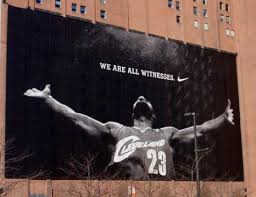


How LeBron James Mastered the Media
From Bryan Curtis, writing in The Wringer:
After Game 3 of the NBA Finals, reporters surrounded Kevin Love in the Cavaliers’ locker room. ESPN’s Brian Windhorst stood at the group’s outer edge. This is an advantage of working for the Worldwide Leader; Windhorst can tap into the company’s boom mics and hear the interviews from afar. But on this night, Windhorst was also working an angle. He wanted to see whether LeBron James was limping.
James had turned his ankle during Game 3, and Windhorst figured he’d make for the shower when reporters had their backs turned. So Windhorst positioned his body in such a way that he seemed to be listening to Love but was really surveilling James.
If you talk to the people who cover James, they’ll tell you he uses court vision on a roomful of reporters the same way he uses it on an NBA defense. As James walked by, he glanced at Windhorst and said, “You’re looking to see if I’m limping, aren’t you?”
Windhorst didn’t say anything. He just shook his head yes.
“As if I’d let you see it anyway,” James said, walking to the shower unimpeded.
“Which is funny,” Windhorst told me later. “Because he was dealing with a hand injury I didn’t know about.”
James flashed that kind of extrasensory perception with the media throughout the playoffs. With the exception of his head-butting with Mark Schwarz, James carefully controlled what he was saying and yet left most reporters satisfied, even as his season ended in humiliating fashion.
Windhorst thought the press conference James gave on the off-day between games 3 and 4 was one of his best. James’s eyes were lit up like they were in the season-opening session when he talked about Donald Trump. With the Finals all but over, James was loose. He said everybody knew Kevin Durant would be great “besides Portland”; that the people who thought he should drive to the rim on every play were imagining a video game LeBron with fatigue and injuries turned “all the way down to zero.” For a guy who usually insists on talking about the present, he was willing to offer perspective.
Other times during the Finals, James smiled as he batted away “trick” questions from the Cavs’ beat writers; he held up the brace on his right wrist and chuckled as cameras clicked away; and he addressed reporters by first names like “Marc” and “Rachel.”
Rachel—Nichols—got the James treatment when she interviewed him on camera for ESPN before the Finals began. The NBA mandates that such interviews last only 10 minutes. But when the league’s press minder stepped in, James said, “I’m good, I’m good. You know when Rachel and I get together, it’s like 60 Minutes or something. We got a lot to talk about.”
Eight years ago, after The Decision, it was common to hear reporters call James a choker and a traitor. In the strange calculus where reporters grade players on how well they spin them, it was also common to hear that James was unsophisticated about the NBA media game—“self-absorbed, shameless, and out of touch,” as one of the nicer reviews put it.
Now, reporters call James the model of a press-savvy and press-friendly megastar. “When you get those golden moments, he is the most engaging interview subject you could ever find in the sports world,” Windhorst said.
Three things have allowed James to master the media game. First, he won titles. Then James got religion—or, at least, better advice—about feeding reporters. But the final factor has little to do with James. It turns out what the NBA media thinks about the world’s best player depends entirely on who the “media” is.
“Where are my three wives?” James shouted across the locker room after a game this spring. That’s his nickname for The Athletic’s Jason Lloyd, Cleveland.com’s Joe Vardon, and ESPN’s Dave McMenamin—the reporters who are around him the most. Calling them “wives” is an acknowledgment of both an intimate relationship and journalistic polygamy: James may favor one beat writer one day and another the next. The nickname is one of “at least semi-endearment,” Vardon told me. It could be worse. When McMenamin and Chris Haynes covered the Cavs beat for ESPN, James called them “salt and pepper.”
The talks James has with his beat writers often sprawl beyond basketball. “We’ve literally had conversations on, ‘Do you believe in fate?’” McMenamin said. “How often does that occur on the NBA beat?”
To read the rest, click here.